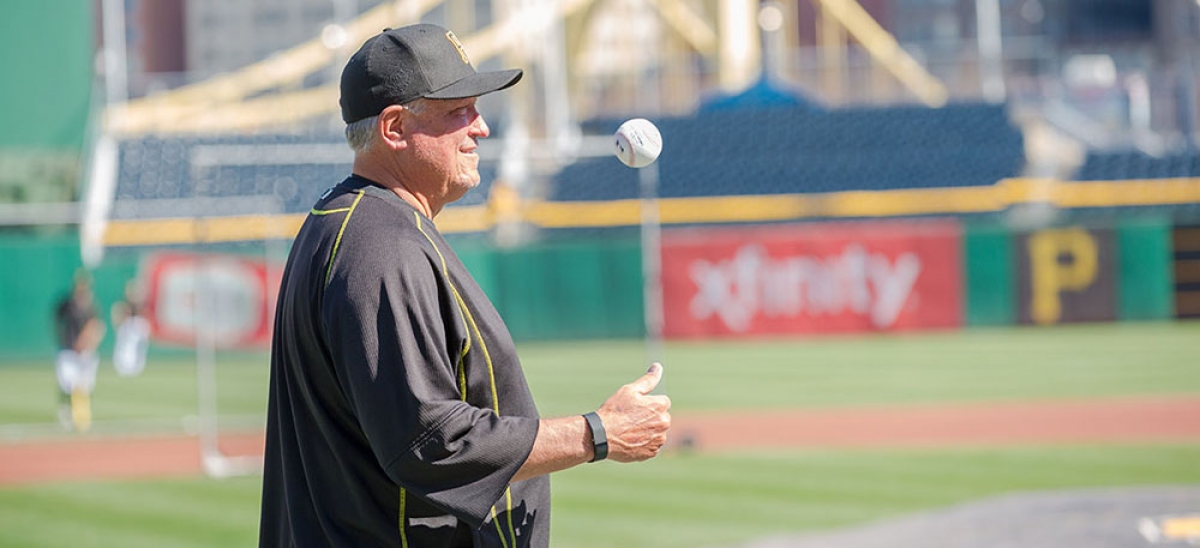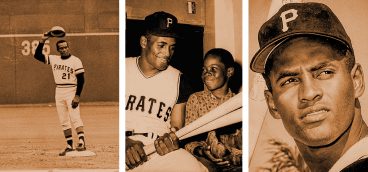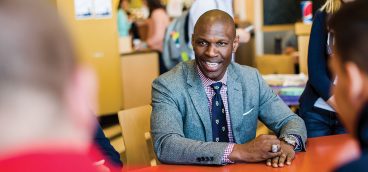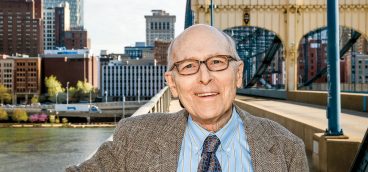Clint Hurdle, Baseball Impresario

I believe that all people inherently have at least one passion. And if that passion can be turned into a livelihood, life becomes special. I’ve had a passion for the game of baseball since I was 5 years old. And now, at the age of 58, instead of running to my backyard to play the game, I hustle onto the grounds of Pittsburgh’s beautiful PNC Park. It’s really a dream come true for me.
As a child, and all the way through my teens, like a lot of kids, I dreamed of being a Major League baseball player. But when I actually got to the majors, at the tender age of 20, it was overwhelming. And during my winding trip down the “Yellow Brick Road” of life in the “big time,” I’ve encountered adversity. I’ve been divorced twice. I’m a recovering alcoholic. But I can also say that I’ve played ball with Johnny Bench, Tom Seaver and other Hall of Famers. I’ve been to the World Series three times, and have traveled far and wide following my passion. All the experiences I’ve had—good and not-so-good—have shaped me into the person I am today.
I was born and spent the early part of my life in Big Rapids, Mich., which was a lot like Pittsburgh. The town was located within the Rust Belt. For us, going to Detroit was like a trip to the Emerald City. But in my family, you rolled up your sleeves and did your job. A dollar was a dollar. A person’s word meant something. In our house, the best of family values were in play.
My parents are two of the best people I’ve ever known. Dad is 82. Mom is 80. And they’ve always been big supporters of my two sisters and me. To this day, I still call them two or three times a week. Both are college educated, but my dad is really a self-made man. He had a bunch of different jobs while I was growing up, and we often lived paycheck to paycheck. But when I was around 4 years old, he moved us from Michigan to Florida—with no job awaiting him. Before long, however, he was working as a computer program engineer. When he retired, at 62, he was the senior engineer for computer programmers at NASA, with 300 people working under him. And what can I say about my mom? She’s a breast cancer survivor and, even now, if it happens to be “game day,” she finishes our phone call by saying, “Give it everything you’ve got.”
Baseball always held a prominent place in the Hurdle family. My grandfather was offered a professional contract as a pitcher, but had to abandon that dream and go to work when his father passed away. For 48 years, until he retired, he worked in a Ford factory to keep a roof over his family and food on their table. My dad was also a good enough player to be offered a contract with the Chicago Cubs, as an infielder. But he got drafted into World War II, and that was that. So mine was the family’s third opportunity to play pro baseball. I just had to make it.
I entered the professional ranks at age 17, and it was exciting, especially when I was bumped up to the majors three years later. But the expectations that came along with this were hard to handle. Early on, I landed on the cover of Sports Illustrated. I was just a kid, from a small school, in a small town, who found himself suddenly on the big stage with big-time attention, and I thought it was my job to make everyone happy. One of the lessons I learned back then was that, if you try to please everyone, you have a good chance of pleasing no one, especially yourself.
As the seasons wore on, I grew tired of being the “Golden Child,” with people expecting the sun to rise and set in the crack of my backside every day. Long story short, my performance as a player did not meet expectations. I felt the agony of coming up short and letting people down, so I numbed myself with alcohol, trying to kill the pain of what I considered to be failure. But while I didn’t get sober during my playing days, I managed to resurrect my career a bit by becoming a utility player, i.e. learning to play different positions. Then came “male menopause.” At that point, I had been married and divorced twice, and surely had a drinking problem. But on the other hand, I had a good job and was good at it. Still, I couldn’t help but ask myself, “Is this all there is?” It was at that time that I started to think that I might actually have a purpose in life beyond the playing field. Just maybe, I was put here not to serve myself, but to serve others.
Fortunately for me, the best part of my life began at age 40. Life experience put me in the position I’m in right now. As a coach first and then a manager, I’ve been given the opportunity to help turn boys into men, and men into leaders, and I’ve shared the lessons of my life to help make their roads to success less difficult. If not for all my ups and downs, I probably would have been the type of guy who forces his kids to play ball to learn how to compete, and how to win. I know players whose fathers did that. I also know fathers who are doing that now. But when I look at my son, Christian, who’s 11, I see all the attributes that I didn’t have at that point in my life. He’s sensitive and compassionate. He has empathy. And he has the courage to do what he wants to do. In fact, when he was 4 years old, he played tee-ball. At the end of the season, I asked him, “So, what do you think?” He said, “I’m out.” “You’re out?” I shot back. “It’s way too intense, Dad. Way too intense.” And surprising myself a little, I simply replied, “I get it, son.”
Years ago, I came across a quote from John Lennon that resonated with me. When he was in school, one of his teachers asked, “What do you want to be when you grow up?” “Happy,” he replied, to which his teacher responded, “I don’t think you understand the assignment.” The young Lennon then countered, “I don’t think you understand life.” So, I don’t know much, but I know this: If you’re happy, you’re way ahead. And, to this day, my son lets me know what makes him happy. It’s great because I’ve developed a real appreciation for who he is. He loves coming to the clubhouse, but doesn’t want to shag balls or hit. He’s content just talking to the guys.
I had been dating my current wife, Karla, for six years when I finally mustered up the courage to ask her to marry me. It was my third time, but for Karla, her first. I knew what it had cost me to get out of my two previous attempts—emotionally and financially. Yet there I was, asking this girl from a small town in eastern Pennsylvania to help me try again. So I popped the question: “Karla, will you marry me?” She looked at me and said, “That’s an interesting question.” I said, “But that’s not an answer.” So she sat me down and told me, “There’s a fun guy in there, Clint. He’s a good guy, but doesn’t come out enough. You’ll never be able to make me happy until you find a way to make yourself happy.” “So, does that mean we’re finished?” I asked. She said, “No. But you’ve got some work to do.” In essence, Karla forced me to find out what makes me happy, and what doesn’t. So I made a list of things I was good at and things I wasn’t; good decisions I’d made, and bad ones, too. Then I asked myself, “How can I be the best Clint that’s ever been?” Then I had an epiphany, of sorts. “Why don’t we just start with the drinking?” So I started there.
During my recovery, I wanted a male counselor but got stuck with a female. Being a man, I thought, “How could she understand my pain?” But it turned out to be a blessing. Her name was Karla (believe it or not), and she helped me to understand that, for me, life had always been either a game or a fight. And when I didn’t do well, I took things personally and withdrew. I held my feelings inside for so long that, at a certain point, it was all too much. To escape, I chose to “self-medicate,” and this all could very well have begun with that Sports Illustrated cover. So I got sober, and reestablished my Christian faith. After that, things started falling into place.
…If you don’t move with the times, the times will move by you.
—Clint Hurdle
I’ve now enjoyed 17 years of sobriety, and try to model the behavior that I want to instill in others. I believe that, if my players study me long enough, they’ll recognize the consistency in what I do; how I take wins and losses; how I handle practice; and how I interact with my coaches, the press and the public. I guess I’ve reached my destination. There’s no doubt in my mind that this is where I was meant to be. I believe that God had this plan for me all along. I just had to get through some things and learn. And I believe that I have. I carefully reviewed my past and learned a lot from it. And this put me in a position to have a future—and I have one now.
In addition to my wise young son, Christian, I have two daughters. My oldest, Ashley, from a previous marriage, is 30, and our relationship has never been stronger. And then there’s my younger daughter, Madison, who’s 13, and a “special needs” child. Maddy’s challenges (she has Prader-Willi syndrome) have changed me in ways that I never could have predicted. Prader-Willi affects only one of every 12,000–15,000 children. Can you imagine feeling hungry all the time? That’s how it is. If you’re awake, you’re hungry. So you eat and eat, but never feel full. It’s caused by a deletion of the 15th chromosome, which happens at conception. In other words, it’s a birth defect and, in the history of birth defects, there’s not one recorded cure. But that doesn’t mean there won’t be someday. So I’m the national spokesperson for Prader-Willi Syndrome, and Karla and I help to raise money for the cause. All in all, Maddy has been a blessing. She has helped my wife and I to grow in our relationship like we never would have grown on our own. Without Maddy, I don’t know if I would ever have understood fully the concept of unconditional love.
From my dad, who was my coach for a long time, I learned three things: to trust him; that he cared about me; and that if I listened to him, he could make me better. It wasn’t until further down the line that I actually understood what all of this meant. When I got into coaching, I expressed those three simple points with every player I encountered because, if a player trusts his coach and knows that his coach cares about him, he will improve. Guaranteed.
When the opportunity to manage the Pirates was presented to me, I was also interviewing for the manager’s job with the Mets. Everyone in my inner circle said, “New York’s the place to go, Clint.” Now, the Mets organization is great, but the guys in Pittsburgh seemed exceptionally smart and creative. They had skills I didn’t have, and had already done the work that was needed.
There was a clear understanding of individual responsibility, and an understanding of group gain from collective effort. I felt blessed to have the opportunity to come to a place and work with men who had one common goal, and didn’t care who got the credit. They made me better and smarter. But more than that, they made me feel like they needed me in the dugout.
We’re at a really great point in our organization. We’ve started to be successful. But how do you continue to increase your success? It’s not really good enough to get to the point where you play a “wild card” game every year. So how do you keep moving forward? How do you improve? Many organizations begin to lose traction at the very point when good things start to happen. Some begin talking about changing their core philosophies because they didn’t get the desired results. Others start getting individualistic—players, scouts, coaches, managers, front office people. Everyone begins to tout their individual stats and accomplishments. But we’ve got a great opportunity here in Pittsburgh. We believe in ourselves. We believe in our process. To me, it’s very exciting to be just a small part of a large group where there’s a “greater good” involved.
In recent years, the game of baseball has changed a lot. For example, it goes without saying that you have to field a lineup that can score runs. But you also have to field one that’s designed to stop runs from scoring. That’s called “run prevention.” (We used to call it “good baseball.”) Today, we calculate a pitcher’s release time off the mound. We consider different ways to hold runners on first base and new ways to cover second. We calculate the time it takes for a catcher to transfer the ball from his glove to his hand; and so on. When you consider all the schemes being used today, it’s wild. But if you don’t move with the times, the times will move by you.
In addition, there are so many different ways fans can interact with and be a part of the game today, and this has opened up a whole new fan base. The vibe is electric. Some nights, it’s like Halloween, with people dressed like pirates waving those Jolly Roger flags. And let’s not forget PNC Park. When the sun begins to set, the scene is like a stunning picture postcard. More than 70 million people went to Major League games last year, and more than 40 million to games in the Minors. So more than 110 million fans still have a burning passion for the magic of baseball.
Through the years, I’ve learned tounderstand not just the game of baseball, but its fans, too. We won 98 games last year, which should have put us in contention for the World Series. But we had to survive the playoffs first, and didn’t, which was heartbreaking for our team and the city. I think it was the late, great Major League Baseball commissioner, A. Bartlett Giamatti, who said, “The game’s designed to break your heart.” Well, the wonderful thing about the human heart is that it’s the strongest muscle in the body. And every time it gets broken, it heals a bit stronger.






